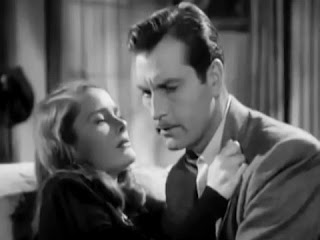 |
| Randolph Scott and Gypsy Rose Lee |
Former con man "Honest" John Calhoun (Randolph Scott of Captain Kidd) owns an Alaskan nightclub and saloon which is managed by Pop Candless (Charles Winninger). Pop's daughter, Lettie (Dinah Shore), is breathlessly in love with handsome piano player, Steve (William Marshall), but there is a rumor that Steve may have a wife and children. Then John's old girlfriend, an entertainer named Belle De Valle (Gypsy Rose Lee), turns up as the star attraction at the saloon -- and with marriage in mind. When Honest John decides to open a bank and importunes everyone to put their money in it, the trouble really begins.
Belle of the Yukon is one of those movies that is perfectly pleasant while it's unfolding, but when it's over you realize that there really wasn't much to it. There's no great plot to speak of aside from the misunderstandings between Lettie and Steve and John and Belle, and attempts to make off with the bank's gold engineered by George (Robert Armstrong) and Sheriff Maitland (Guinn "Big Boy" Williams). The songs by Burke and Van Heusen [Duffy's Tavern] are no great shakes although "A Slay Ride in July" is one that could grow on you. Scott is stalwart but not really a deft comedian; Gypsy Rose Lee (the subject of Gypsy) is okay but nothing that special; Dinah Shore sings quite well and is reasonably appealing; and William Marshall has little to do but look quite dreamy and now and then punch out the sheriff. Charles Winninger and Florence Bates as Lee's companion easily walk off with the movie, which so often was the case. Dinah Shore and William Marshall
Verdict: Amiable if minor-league piffle with some good performances. **1/2.

















